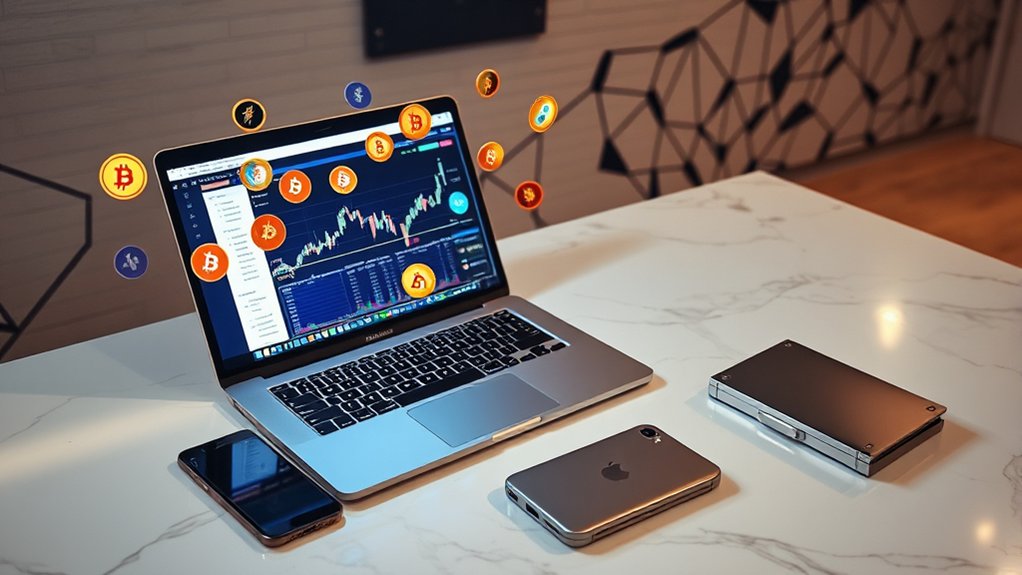Getting into cryptocurrency investing isn’t just about tossing money at Bitcoin or Ethereum. It’s a risky venture. The market is unpredictable. One minute you’re up, and the next, boom! Down you go. Choose a secure exchange, like Coinbase or Kraken—don’t just go for the cheapest. Understand the verification processes; skipping this could cost you big. And remember, research those coins before investing. The crypto world is riddled with scams. Stick around for more insights on maneuvering through this chaos.

Investing in cryptocurrency is not for the faint-hearted. Risks are everywhere, lurking like a shark in murky waters. Market fluctuations can wipe out your investment quicker than you can hit the “buy” button. And forget about government-backed safety nets—cryptocurrency operates in a gray area of regulation. You might score big, or you might end up with a digital pocketful of regret.
Choosing the right cryptocurrency exchange is like picking a trustworthy friend to go to a concert with. You want one that’s secure, has reasonable fees, and offers a variety of cryptocurrencies. Think of Coinbase, Robinhood, or Kraken. Additionally, look for platforms that allow you to buy cryptocurrency easily once your account is set up.
Picking a cryptocurrency exchange is like choosing a reliable concert buddy—prioritize security, fees, and variety to protect your investment.
But be warned: verification processes are a must. It’s not just a casual sign-up; the exchanges need to comply with rules. Get it right, or risk losing your digital treasure.
For beginners, starting with Bitcoin or Ethereum is common. They’re the big names, the headliners of this concert.
But diving into lesser-known coins could be like jumping into a mosh pit—exciting but risky. Scams like pump-and-dump schemes are real, and they’re lurking around every corner.
Don’t forget to secure your digital coins in a wallet. Hot wallets are convenient but can be hacked. Cold wallets offer better security, but good luck accessing them quickly when the market is booming. Cryptocurrency operates on blockchain technology, ensuring that transactions are transparent and immutable once recorded. Moreover, decentralization allows users to participate globally without a central authority controlling transactions.
In this fast-paced world, it’s vital to know what you’re doing. Long-term holding? Active trading? Whatever path you choose, buckle up. It’s going to be a bumpy ride.
Frequently Asked Questions
What Are the Tax Implications of Cryptocurrency Investments?
Cryptocurrency investments come with a hefty tax bill. The IRS sees them as property, not currency. So, every sale or trade? Taxable event.
Short-term gains? Hello ordinary income rates—up to 37%. Long-term? A bit kinder, at 0%, 15%, or 20%.
And remember, losses can offset gains, but don’t get too hopeful—$3,000 limit on ordinary income offsets. Track every transaction, or the tax man will come knocking.
Welcome to crypto.
How Can I Securely Store My Cryptocurrency?
Storing cryptocurrency safely? It’s not a walk in the park.
Hot wallets? Sure, they’re convenient, but they’re like leaving your front door wide open for hackers.
Cold wallets? Now we’re talking. They keep your crypto offline, away from prying eyes. Think USB drives or fancy hardware wallets—much safer.
And hey, diversify your storage. Don’t put all your eggs in one basket.
Because losing crypto? That’s not just sad; it’s tragic.
What Is the Difference Between Coins and Tokens?
Coins and tokens? They’re not the same, folks.
Coins are like the head honchos of their own blockchains. Think Bitcoin.
Tokens? They’re the sidekicks, relying on platforms like Ethereum.
Simplicity alert! Creating a token is way easier.
Coins are for spending and storing value, while tokens can do a bunch of things—like governance.
So, if you’re aiming for blockchain glory, remember: coins stand alone, tokens ride shotgun.
Simple enough, right?
How Do I Choose a Reliable Cryptocurrency Exchange?
Choosing a reliable cryptocurrency exchange? Easy, right? Not so fast.
First, check their reputation. A shoddy track record means trouble.
Security is key—look for two-factor authentication and cold storage.
Regulatory compliance? Crucial, or you might find yourself in hot water.
And how about user reviews? They tell the real story.
Finally, consider fees—nobody likes surprise charges.
Get it right, or risk losing your hard-earned cash in the crypto jungle.
What Are Common Scams to Watch Out for in Crypto?
Scams in crypto? Oh, they’re everywhere.
Bitcoin investment schemes promise high returns but just take your cash.
Rug pulls? Classic move—hype a project, vanish with your money.
And don’t get fooled by fake celebrity endorsements; they’re not investing in your future.
Phishing attacks are sneaky too, tricking you into giving up your private keys.
Remember, if it sounds too good to be true, it probably is.
Stay sharp, folks!





